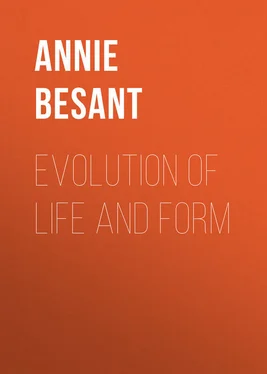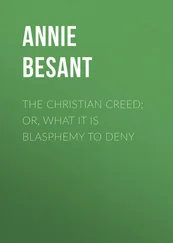Annie Besant - Evolution of Life and Form
Здесь есть возможность читать онлайн «Annie Besant - Evolution of Life and Form» — ознакомительный отрывок электронной книги совершенно бесплатно, а после прочтения отрывка купить полную версию. В некоторых случаях можно слушать аудио, скачать через торрент в формате fb2 и присутствует краткое содержание. Жанр: foreign_antique, foreign_prose, на английском языке. Описание произведения, (предисловие) а так же отзывы посетителей доступны на портале библиотеки ЛибКат.
- Название:Evolution of Life and Form
- Автор:
- Жанр:
- Год:неизвестен
- ISBN:нет данных
- Рейтинг книги:4 / 5. Голосов: 1
-
Избранное:Добавить в избранное
- Отзывы:
-
Ваша оценка:
- 80
- 1
- 2
- 3
- 4
- 5
Evolution of Life and Form: краткое содержание, описание и аннотация
Предлагаем к чтению аннотацию, описание, краткое содержание или предисловие (зависит от того, что написал сам автор книги «Evolution of Life and Form»). Если вы не нашли необходимую информацию о книге — напишите в комментариях, мы постараемся отыскать её.
Evolution of Life and Form — читать онлайн ознакомительный отрывок
Ниже представлен текст книги, разбитый по страницам. Система сохранения места последней прочитанной страницы, позволяет с удобством читать онлайн бесплатно книгу «Evolution of Life and Form», без необходимости каждый раз заново искать на чём Вы остановились. Поставьте закладку, и сможете в любой момент перейти на страницу, на которой закончили чтение.
Интервал:
Закладка:
Evolution of Life and Form Four lectures delivered at the twenty-third anniversary meeting of the Theosophical Society at Adyar, Madras, 1898
[FIRST LECTURE.]
ANCIENT AND MODERN SCIENCE
My Brothers: – The subject on which I am to address you this morning, and the three mornings that follow, is one of considerable complexity and difficulty. I do not apologise to you for the difficulty of my theme. When we meet here in our Anniversary Meeting, we meet as students and not simply as superficial men and women of the world. We try to prepare ourselves, by study, for the exchange of thought which in these gatherings takes place, and although the subject is a difficult one, although it is not possible to make it clear and intelligible without the use of certain technical terms, yet, to the student technical terms – being precise – are really the easiest to understand, and inasmuch as, in a great majority at least, we are students, I who speak, and you who listen, we may be content to treat the subject in a somewhat formal and technical way. Roughly, my outline is this. I want to lay before you an intelligible conception of evolution, taking it on its two sides, that of the evolving life and that of the developing forms. I begin by laying before you a sketch of the methods of "Ancient and Modern Science," the direction in which each has worked, and is working, the ultimate union that, we hope, may take place between them. For what could more fully presage the good of the whole world, what could promise more happily for the relationship between the different races of humanity, than to draw together on the plane of mind the science of antiquity and of modern days, the science of the East and of the West, and, by wedding them to each other, draw together the nations that are now divided, and make objective that brotherhood of humanity of which we dream.
Dealing first with ancient and modern science in this broad and general way, and taking that as my subject for this morning, I shall pass on to-morrow to speak on the "Functions of the Gods," meaning by that phrase the activities of that invisible side of nature on which the whole of the visible depends. Whether we use here the name "Devas" to represent those developed spiritual intelligences, or whether with the child of Islâm, with the Hebrew or the Christian, we speak of the "Angels" and "Archangels," the name matters nothing; the conception is common to every faith of man. We shall study their functions in the universe, and try to understand how they act as the ministers of the Divine Will. Then we shall pass on to treat of that "Evolution of Life" which lies underneath the evolution of forms. Finally, we shall treat the "Evolution of Forms," and see how, in that evolution, is the promise of final perfection, how all is working to a perfect ending, how the best that we can dream of is less than the performance of God.
That is the outline of our work. Let us at once begin the first section of the subject – Ancient and Modern Science.
Now, in the olden times, in those times to which in this land our thought turns back most fondly with reverence and with pride, in those times, here, as in every other ancient land, Religion and Science were wedded together, and there was no discord between the intelligence and the spirit. It matters not whither you wander amid the ancient nations of the world: you may travel through the whole of Chaldea; you may study the remains of ancient Egypt; you may go through Persia and search amid her monuments; you may cross the Atlantic to America, and unbury the cities that were lost ere yet the Aztecs had made the mighty State which fell under the blows of the Spaniards; you may go into China and, in the vast recesses of that well-nigh unknown land, you may search for what has been left there from ancient days; or without going outside the limits of your own land, you may take the literature that is our pride, the mighty books written by the Ṛishis of the past; and everywhere antiquity speaks with a single tongue. Religion reveals the spirit, the spiritual truth which is one. Intelligence studies that truth in its manifold manifestations, and its work; science, studying the phenomena which are images of aspects of the Divine, is the handmaid, is the sister, of religion, and between them discord is unnatural and fatal to progress. That is the ancient view; but when we come to our own century a new phenomenon presents itself to our gaze – religion on the one side suspicious of science in its progress, science on the other hand apt to be proudly contemptuous of religious claims. How has the divorce arisen? Why this discord between two of the great helpers of human evolution? The reason is not far to seek. In the western world the science of the elder time, the science of antiquity, disappeared in the great flood of barbaric invasions, underneath the whirlpool caused by the ruins of the Roman Empire, and later on, underneath the wreckage of that same Empire with its new centre in Constantinople. The invasions of barbarians, both from the East and the North, sweeping over the European continent, brought ignorance in the wake of barbaric conquest. The result was that night came down upon knowledge and thick darkness enveloped the lands which were to be the nursery of a new civilisation. When the Sun of science again began to rise upon the Western world, it presented itself in a form which was alien, nay, which was more than alien, which was hostile to the dominant religion of the time. It came from the children of Islâm. It came from those who recognised Muhammed as their Prophet. From the Muslim schools of Arabia came the first teachers of modern science to Europe. True, they were really by their intellectual ancestry descended from the thought of Greece. They drew their inspiration from the school of Plato through the Neo-Platonists; they reproduced the ideas of Porphyry and Ptolemy, and of other Grecian and Egyptian thinkers, Neo-Platonic and even Gnostic. But they threw over it the garb of Islâm, they presented it in the form of Arabic thought. The result of this was that, as it made its way into Spain in the wake of the conquering Moors, as it came with those who drove out of the Southern Peninsula the rule of the Spanish Christian monarchy, so the first aspect of science to Christians was an aspect of hostility. It came as an invading enemy and not as an illuminant to all. Hence conflict arose; some who were within the limits of the mighty Church of Rome, touched by a longing for the new learning, stretched out their hands to take the gifts that science was bringing. These men were regarded with suspicion, nay, with more than suspicion, with hatred that broke out in bitter persecution. Who can read the history of Roger Bacon, the wondrous monk; who can picture Copernicus on his death-bed as his immortal work is brought to him ere yet his eyes are closed, he having shrunk from earlier publication, lest the stake should be his portion; who can stand in the Field of Flowers in Rome, and see there the statue erected where he was burned to death, who dying in one century, lives for all centuries to come – Giordano Bruno; who can listen to Galileo, as with faltering lips he denies the truth he knows and utters the falsehood that he knows not; who can follow these martyr-steps, led on by bitter memories of blood and fire, without understanding the reason for the hostility of science to religion, without confessing with shame and sorrow that that hostility was caused and was justified by the cruelties wreaked by religion on science, when science was young and feeble? Every one of us who stands upon the side of religion should recognise that we are reaping the bitter harvest of our own past errors, and that the law is just which brings upon us the difficulties and opposition we encounter in our modern days.
Читать дальшеИнтервал:
Закладка:
Похожие книги на «Evolution of Life and Form»
Представляем Вашему вниманию похожие книги на «Evolution of Life and Form» списком для выбора. Мы отобрали схожую по названию и смыслу литературу в надежде предоставить читателям больше вариантов отыскать новые, интересные, ещё непрочитанные произведения.
Обсуждение, отзывы о книге «Evolution of Life and Form» и просто собственные мнения читателей. Оставьте ваши комментарии, напишите, что Вы думаете о произведении, его смысле или главных героях. Укажите что конкретно понравилось, а что нет, и почему Вы так считаете.











